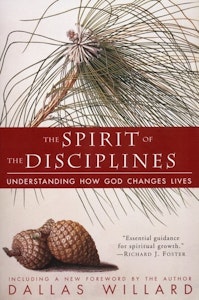Introductory Note:
How does authority work in a “community of mutual submission?” If Christian fellowship is a place of equality and mutual servanthood, free from the ambitions and hierarchies found outside of God’s kingdom, what place is there for one to direct another, or for this one to obey that one?
Dallas Willard offers a beautiful vision here of deep fellowship modeled after Jesus. In the completely different order of God’s kingdom, wise authority is a gift —an act of service—offered from the one with experience to the one in need of that experience. It requires humility on the part of the one who recognizes her need for a wise guide, and humility on the part of the leader who recognizes that any authority she has is simply God’s gift at work in her, developed through her own submission to Christ.
Grace Pouch
Content Manager
 Excerpt from The Spirit of the Disciplines
Excerpt from The Spirit of the Disciplines
The highest level of fellowship — involving humility, complete honesty, transparency, and at times confession and restitution — is sustained by the discipline of submission.
In the letter to the Hebrews we read: “Obey them that have the rule over you, and submit yourselves: for they watch for your souls, as they that must give account, that they may do it with joy and not with grief” (13:7). In 1 Peter those older in The Way are told to take the oversight of the flock of God, not by being forced to do so and not as lords over God’s heritage, but as examples to the flock (5:2 – 3). The younger are then told to submit themselves to this gentle oversight by the elders, and all are caught up together as a community of mutual servants in mutual submission: “Yea, all of you be subject one to another, and be clothed with humility: for God resisteth the proud and giveth grace to the humble” (5:5; see also Eph. 5:21).
The order in the redemptive community here implied obviously is not a matter of an iron hierarchy in which unwilling souls are crushed and driven. Instead, it functions in the power of truth and mercy inhabiting mature personalities, being the expression of a kingdom not of this world (John 18:36) — but truly a kingdom nonetheless. Otherwise the church would revert to the model of purely human government. Unfortunately, we see this actually happening in certain misguided attempts at Christian community. The Way of Jesus knows no submission outside the context of mutual submission of all to all. (Eph. 5:21, Phil. 2:3)
Submission, though, is a call for help to those recognized as able to give it because of their depth of experience and Christlikeness — because they truly are “elder” in The Way. In submission we engage the experience of those in our fellowship who are qualified to direct our efforts in growth and who then add the weight of their wise authority on the side of our willing spirit to help us do the things we would like to do and refrain from the things we don’t want to do. They oversee the godly order in our souls as well as in our fellowship and in the surrounding body of Christ.
But these “wise” people will not be looking at themselves as “leaders” actually. Their being examples we submit to is but one aspect of their submission to servanthood. It is a case of true leadership, not of the drivership that so often prevails in secular society and in some church groups where those “in control” do not know of an alternative.
How truly blessed is this free “order that is in beatitude.”1 Here are the beginnings of that kingdom “cut out without hands” (Dan. 2:34), which will in time fill the earth and make the kingdoms of this world into the kingdom of our God and of his Christ!
- This marvelous phrase is from St. Thomas Aquinas, Summa Theologica, Part One of the Second Part, Question 90, Article 2, Objection 3. ↩︎
Excerpted from Dallas Willard’s The Spirit of the Disciplines. Courtesy of HarperOne (New York, 1998).
Text First Published May 1999 · Last Featured on Renovare.org January 2023


